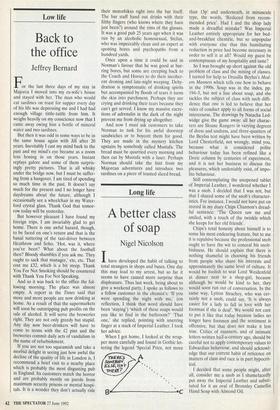Long life
A better class of soap
Nigel Nicolson
Ihave developed the habit of talking to total strangers in shops and buses. One day this may lead to my arrest, but so far it seems to have caused more surprise than displeasure. Thus last week, being about to give a weekend party, I spoke as follows to a fellow customer in the chemist's: 'If you were spending the night with me,' (on reflection, I think that word should have been 'staying') 'which of these soaps would you like to find in the bathroom?' That one,' she replied, pointing with unerring finger at a stack of Imperial Leather. I took her advice.
When I got home, I looked at the wrap- per more carefully and found in Gothic let- tering the legend 'Special Price, not more than 13p' and underneath, in minuscule type, the words, 'Reduced from recom- mended price'. Had I and the shop lady made a dreadful mistake? Was Imperial Leather entirely appropriate for her bed- and-breakfast clientele, but so unpopular with everyone else that this humiliating reduction in price had become necessary in order to sell it at all? Would my guest be contemptuous of my hospitality and taste?
So I was brought up short against the old problem of class and the mixing of classes. I turned for help to Drusilla Beyfus's Mod- em Manners which tells one how to behave in the 1990s. Soup was in the index, pp.
194-5, but not a line about soap, and she tackles the subject of class with such diffi- dence that one is led to believe that her rules of conduct apply to all forms of social intercourse. The drawings by Natacha Led- widge give the game away: all her charac- ters are Sloane Rangers in varying degrees of dress and undress, and three-quarters of the Beyfus text might have been written by Lord Chesterfield, not wrongly, mind you, because what is considered polite behaviour today has been refined like a Doric column by centuries of experiment, and it is not her business to discuss the pleasures, which undeniably exist, of impo- lite behaviour.
Still contemplating the unopened tablet of Imperial Leather, I wondered whether I was a snob. I decided that I was not, but that I shared some of the snob's character- istics. For instance, I would not have put on record HI my diary Chips Channon's dread- ful sentence: The Queen saw me and smiled, with a touch of the twinkle which she keeps for her old friends'.
Chips's total honesty about himself is to some his most endearing feature, but to me it is repulsive because the professional snob ought to have the wit to conceal his snob- bishness. He should explain that there is nothing shameful in choosing his friends from people who share his interests and approximately the same level of culture. It would be foolish to seat Lord Weidenfeld at dinner next to a shop-girl, because although he would be kind to her, they would soon run out of conversation. In the same way, Lytton Strachey, who was cer- tainly not a snob, could say, 'It is always easier for a lady to fall in love with her footman if she is deaf. We would not care to put it like that today because ladies no longer have footmen and the sentiment is offensive, but that does not make it less true. Critics of manners, and of intimate letters written half-a-century ago, should be careful not to apply contemporary values to Edwardian behaviour, and should acknowl- edge that our current habit of reticence on matters of class and race is in part hypocrit- ical.
I decided that some people might, after all, consider me a snob as I shamefacedly put away the Imperial Leather and substi- tuted for it an oval of Bronnley Camellia Hand Soap with Almond Oil.


















































 Previous page
Previous page